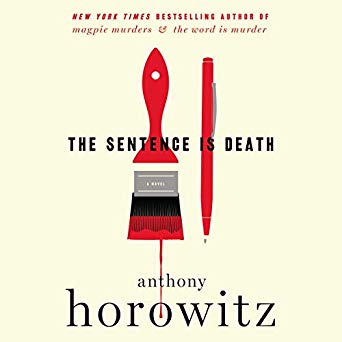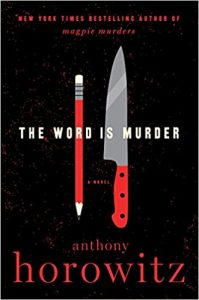 The Sentence is Death (Hawthorne, #2) by Anthony Horowitz, Rory Kinnear
The Sentence is Death (Hawthorne, #2) by Anthony Horowitz, Rory Kinnear Format: audiobook, eARC
Source: purchased from Audible, supplied by publisher via Edelweiss
Formats available: hardcover, paperback, large print, ebook, audiobook
Genres: mystery
Series: Hawthorne #2
Pages: 384
Published by HarperAudio on May 28, 2019
Purchasing Info: Author's Website, Publisher's Website, Amazon, Barnes & Noble, Kobo, Bookshop.org
Goodreads
8 hours, 36 minutes
Death, deception, and a detective with quite a lot to hide stalk the pages of Anthony Horowitz’s brilliant murder mystery, the second in the bestselling series starring Private Investigator Daniel Hawthorne.
“You shouldn’t be here. It’s too late . . . “
These, heard over the phone, were the last recorded words of successful celebrity-divorce lawyer Richard Pryce, found bludgeoned to death in his bachelor pad with a bottle of wine—a 1982 Chateau Lafite worth £3,000, to be precise.
Odd, considering he didn’t drink. Why this bottle? And why those words? And why was a three-digit number painted on the wall by the killer? And, most importantly, which of the man’s many, many enemies did the deed?
Baffled, the police are forced to bring in Private Investigator Daniel Hawthorne and his sidekick, the author Anthony, who’s really getting rather good at this murder investigation business.
But as Hawthorne takes on the case with characteristic relish, it becomes clear that he, too, has secrets to hide. As our reluctant narrator becomes ever more embroiled in the case, he realizes that these secrets must be exposed—even at the risk of death . . .
My Review:
This series doesn’t so much break the fourth wall as hammer it down to the ground with a police truncheon – and extreme prejudice.
 The Sentence is Death begins much the same way that The Word is Murder kicked off the series – with an unexplained death and ex-cop turned police consultant Daniel Hawthorne interrupting our author/his Watson in the midst of an important real-life event.
The Sentence is Death begins much the same way that The Word is Murder kicked off the series – with an unexplained death and ex-cop turned police consultant Daniel Hawthorne interrupting our author/his Watson in the midst of an important real-life event.
Anthony Horowitz was late to the set on the first day of shooting season 7 of Foyle’s War. Whether the day went exactly as outlined in The Sentence is Death, both the series and the episode are as portrayed in this book. You can still hear the echoes of the fourth wall shattering from here.
Horowitz, more explicitly Watson to Hawthorne’s not just misanthropic but often downright sociopathic Holmes, finds himself dragged into yet another one of Hawthorne’s strangely compelling cases. A case that has already cost at least one man his life, and might very well cost the author his career – if he’s not careful.
The problem for the author is that while he’s never sure that he actually likes Hawthorne – and it’s impossible to blame him for that judgment – the man only comes to “Tony” when he has a truly puzzling case to solve – over and above the fascinating case of Hawthorne himself.
“Tony” can’t resist getting dragged along in Hawthorne’s wake yet again. No matter how much he knows that he should.
Escape Rating A-: This was a rare case where I stayed with the audiobook all the way through. Not that I wasn’t impatient to see how it ended, but the audiobook was just SO GOOD. The narrator, Rory Kinnear, does an excellent job of voicing all the characters and differentiating them all. Each character in the story was very distinct in accent, in tone and in their manner of speaking.
And it’s also short enough of an audiobook that I didn’t have to play too much Solitaire to finish it in less than a week. (Which reminds me, the book is 384 pages, but there is a lot of white space and relatively big printing on those pages. It’s a breeze to read or listen to.)
The series in general, and this entry in particular, feels like a combination of whodunnit, whydunnit and Sherlock Holmes homage. The references to this being a Holmes homage, with Hawthorne as Holmes and Horowitz as Watson, are particularly explicit in this story, to the point where “Tony” (he hates it when Hawthorne calls him that and it differentiates the character IN the book from the writer OF the book – at least a little) tells Hawthorne just how much he dislikes being his Watson. Particularly since, just like the popular image of Watson, he never seems to figure out whodunnit ahead of his Sherlock.
Hawthorne is an extremely annoying character, and “Tony” is generally pretty annoyed at him. Hawthorne is always a disruption to his life – and it seems like working with Hawthorne puts “Tony” in danger of losing either his career or his life at every turn.
One of the mind-twisty parts of this story, in addition to the murder itself, is just how much of a nebbish the character of “Tony” turns out to be. There’s always a bit of a disjunct in my mind, as my mental image of the author bears a sharp resemblance to Michael Kitchen’s portrayal of Christopher Foyle in Foyle’s War. Not that I have any personal knowledge, but Foyle’s War was my first serious exposure to the author and I recognize I’ve conflated him with the character he created. It’s not about how either of them looks, it’s that Foyle is both thoughtful and decisive, and it’s jarring to see “Tony” as a bit of a milquetoast. Hawthorne pushes him around – a LOT – and so do the police detectives assigned to the case.
But that case is intricate and absorbing and convoluted. The resolution is completely unexpected, not just by “Tony” but by the reader as well. At the same time, it thoroughly follows the conventions of the mystery genre, so that once you do know whodunnit, you can see that all the clues have been there all along – just like they are supposed to be – and that the solution was obvious IF you made the correct connections. As Hawthorne certainly did.
In the end, all is made tragically clear. But “Tony” is tired of playing Hawthorne’s bumbling Watson. He wants out. He wants to go back to Foyle’s War and his next “real” Sherlock Holmes book, Moriarty.
But we just know that he’ll be swept into Hawthorne’s orbit yet again, as soon as there’s another case worth writing about. And we’ll be sucked back in right along with him!






















